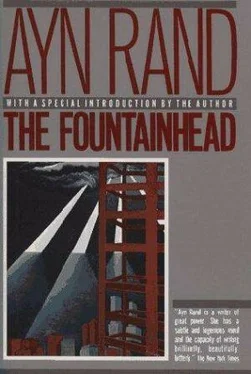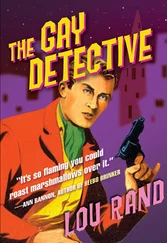She would come in, unsummoned, in the middle of the night, with a cup of hot coffee, and he would snatch it gratefully, not pausing in his work. He would find fresh sandwiches left on his desk when he needed them badly. He had no time to wonder where she got things. Then he discovered that she had established an electric plate and a stock of supplies in a closet. She cooked breakfast for him, when he had to work all night, she came in carrying dishes on a piece of cardboard for a tray, with the silence of empty streets beyond the windows and the first light of morning on the rooftops.
Once he found her, broom in hand, sweeping an office; the maintenance department had fallen apart, charwomen appeared and disappeared, no one had time to notice.
"Is that what I'm paying you for?" he asked.
"Well, we can't work in a pigsty. I haven't asked you what you're paying me, but I want a raise."
"Drop this thing, for God's sake! It's ridiculous."
"What's ridiculous? It's clean now. It didn't take me long. Is it a good job?"
"It's a good job."
She leaned on the broom handle and laughed. "I believe you thought, like everybody else, that I'm just a kind of luxury object, a high-class type of kept woman, didn't you, Gail?"
"Is this the way you can keep going when you want to?"
"This is the way I've wanted to keep going all my life — if I could find a reason for it."
He learned that her endurance was greater than his. She never showed a sign of exhaustion. He supposed that she slept, but he could not discover when.
At any time, in any part of the building, not seeing him for hours, she was aware of him, she knew when he needed her most. Once, he fell asleep, slumped across his desk. He awakened and found her looking at him. She had turned off the lights, she sat on a chair by the window, in the moonlight, her face turned to him, calm, watching. Her face was the first thing he saw. Lifting his head painfully from his arm, in the first moment, before he could return fully to control and reality, he felt a sudden wrench of anger, helplessness and desperate protest, not remembering what had brought them here, to this, remembering only that they were both caught in some vast, slow process of torture and that he loved her.
She had seen it in his face, before he had completed the movement of straightening his body. She walked to him, she stood by his chair, she took his head and let it rest against her, she held him, and he did not resist, slumped in her arms, she kissed his hair, she whispered: "It will be all right, Gail, it will be all right."
At the end of three weeks Wynand walked out of the building one evening, not caring whether there would be anything left of it when he returned, and went to see Roark.
He had not telephoned Roark since the beginning of the siege. Roark telephoned him often; Wynand answered, quietly, just answering, originating no statement, refusing to prolong the conversation. He had warned Roark at the beginning: "Don't try to come here. I've given orders. You won't be admitted." He had to keep out of his mind the actual form which the issue of his battle could take; he had to forget the fact of Roark's physical existence; because the thought of Roark's person brought the thought of the county jail.
He walked the long distance to the Enright House; walking made the distance longer and safer; a ride in a cab would pull Roark too close to the Banner Building. He kept his glance slanted toward a point six feet ahead of him on the sidewalk; he did not want to look at the city.
"Good evening, Gail," Roark said calmly when he came in.
"I don't know what's a more conspicuous form of bad discipline," said Wynand, throwing his hat down on a table by the door, "to blurt things right out or to ignore them blatantly. I look like hell. Say it."
"You do look like hell. Sit down, rest and don't talk. Then I'll run you a hot bath — no, you don't look that dirty, but it will be good for you for a change. Then we'll talk."
Wynand shook his head and remained standing at the door.
"Howard, the Banner is not helping you. It's ruining you."
It had taken him eight weeks to prepare himself to say that.
"Of course," said Roark. "What of it?"
Wynand would not advance into the room.
"Gail, it doesn't matter, as far as I'm concerned. I'm not counting on public opinion, one way or the other."
"You want me to give in?"
"I want you to hold out if it takes everything you own."
He saw that Wynand understood, that it was the thing Wynand had tried not to face, and that Wynand wanted him to speak.
"I don't expect you to save me. I think I have a chance to win. The strike won't make it better or worse. Don't worry about me. And don't give in. If you stick to the end — you won't need me any longer."
He saw the look of anger, protest — and agreement. He added:
"You know what I'm saying. We'll be better friends than ever — and you'll come to visit me in jail, if necessary. Don't wince, and don't make me say too much. Not now. I'm glad of this strike. I knew that something like that had to happen, when I saw you for the first time. You knew it long before that."
"Two months ago, I promised you ... the one promise I wanted to keep ... "
"You're keeping it."
"Don't you really want to despise me? I wish you'd say it now. I came here to hear it."
"All right. Listen. You have been the one encounter in my life that can never be repeated. There was Henry Cameron who died for my own cause. And you're the publisher of filthy tabloids. But I couldn't say this to him, and I'm saying it to you. There's Steve Mallory who's never compromised with his soul. And you've done nothing but sell yours in every known way. But I couldn't say this to him and I'm saying it to you. Is that what you've always wanted to hear from me? But don't give in."
He turned away, and added: "That's all. We won't talk about your damn strike again. Sit down, I'll get you a drink. Rest, get yourself out of looking like hell."
Wynand returned to the Banner late at night. He took a cab. It did not matter. He did not notice the distance.
Dominique said, "You've seen Roark."
"Yes. How do you know?"
"Here's the Sunday makeup. It's fairly lousy, but it'll have to do. I sent Manning home for a few hours — he was going to collapse. Jackson quit, but we can do without him. Alvah's column was a mess — he can't even keep his grammar straight any more — I rewrote it, but don't tell him, tell him you did."
"Go to sleep. I'll take Manning's place. I'm good for hours."
They went on, and the days passed, and in the mailing room the piles of returns grew, running over into the corridor, white stacks of paper like marble slabs. Fewer copies of the Banner were run off with every edition, but the stacks kept growing. The days passed, days of heroic effort to put out a newspaper that came back unbought and unread.
IN THE glass-smooth mahogany of the long table reserved for the board of directors there was a monogram in colored wood — G W — reproduced from his signature. It had always annoyed the directors. They had no time to notice it now. But an occasional glance fell upon it — and then it was a glance of pleasure.
The directors sat around the table. It was the first meeting in the board's history that had not been summoned by Wynand. But the meeting had convened and Wynand had come. The strike was in its second month.
Wynand stood by his chair at the head of the table. He looked like a drawing from a men's magazine, fastidiously groomed, a white handkerchief in the breast pocket of his dark suit. The directors caught themselves in peculiar thoughts: some thought of British tailors, others — of the House of Lords — of the Tower of London — of the executed English King — or was it a Chancellor? — who had died so well.
Читать дальше










